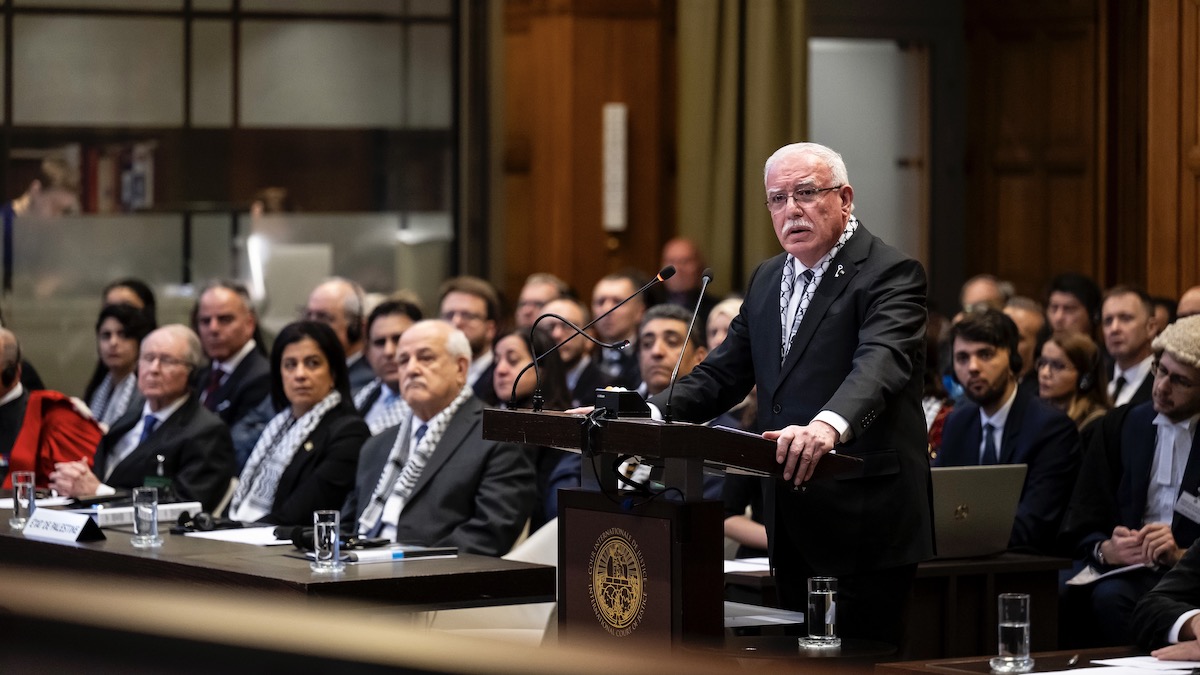Palestinian state delegates submitted their testimonies on Monday, February 19, to the International Court of Justice (ICJ), which started a week-long hearing in a case related to the status of Israel’s occupation of Palestinian territories.
ICJ judges will hear testimonies until February 26, in the case titled “Legal Consequences arising from the Policies and Practices of Israel in the Occupied Palestinian Territory, including East Jerusalem”.
Speaking before the court on Monday, Palestinian Foreign Minister Riyad Maliki asserted that for over a century the “inalienable rights Palestinian people to self determination has been denied and violated” and refuted ahistorical claims made by Israelis of Palestine being an empty land before the creation of the state of Israel.
Maliki accused Israel of practicing apartheid in the occupied territories and demanded the end of over five decades old occupation of their land. He also reiterated that Israel’s current war in Gaza is genocidal and a result of “decades of impunity and inaction” by the international community.
“Ending Israel’s impunity is a moral, political and legal imperative,” Maliki told the court.
The Minister of Foreign Affairs and Expatriates Dr.Riad Malki presents The State Of Palestine’s pleading during the public hearings of the International Court of Justice on the request for an advisory opinion on the legal consequences arising from the policies and practices of… pic.twitter.com/0zKr6T7NVg
— State of Palestine – MFA 🇵🇸🇵🇸 (@pmofa) February 19, 2024
The UNGA decided to seek the advisory opinion of the Israeli occupation after it adopted a resolution voted by the majority of its members on December 30, 2022.
In its submission to the court, the UN has asked specific questions related to the responsibility of the organization in the face of continued violations of Palestinian rights by the Israeli occupation, their forced displacement and attempts to change the demography of the occupied territories especially East Jerusalem. The court will have to consider these matters with regards to rules and principles of international law outlined in the Charter of the United Nations, international humanitarian law, international human rights law, as well as relevant resolutions of the Security Council, the General Assembly and the Human Rights Council.
The UNGA has also asked ICJ’s to opine on the discriminatory policies and laws used by the state of Israel to govern Palestinians and illegal Israeli settlers living in the occupied Palestinian territories.
Altogether 52 countries and three organizations, Organization of African Union, Organization of Islamic Cooperation and the League of Arab States will present their testimonies during the hearing.
It is the largest number of countries participating in a single case in the history of the ICJ. The countries which have decided to participate in the hearing include both those who voted in favor of the UN resolution such as China, South Africa and those who voted against it such as the US and Canada.
Israel has decided to present its position in a written statement instead of submitting an oral statement like most other countries. Nevertheless, it has already announced that it will not consider the opinion of the court “legitimate.”
Israel has a long history of violation of international law
Israel has been repeatedly accused of violating the UN charter and international laws related to occupied territories ever since it occupied the Palestinian territories of West Bank, Gaza and East Jerusalem in 1967.
It has forcefully displaced Palestinians and illegally built over a hundred settlements inside the occupied West Bank where more than 500,000 illegal Israeli settlers live. Israel has been accused of ethnically cleansing occupied East Jerusalem since its illegal annexation by forcing Palestinians to move out and building illegal settlements where around 200,000 more illegal settlers live. It has implemented two different sets of laws related to Palestinians and illegal settlers as well inviting allegations of racial discrimination or apartheid from different quarters.
"There is no dispute as to the right of self-determination of the Palestinian people. It has never been in issue, not since the time of the Mandate. This Court made that clear, two decades ago in the Wall Opinion: it said, loud and clear, “the existence of a ‘Palestinian people’… pic.twitter.com/CCZ2CSKXSI
— State of Palestine – MFA 🇵🇸🇵🇸 (@pmofa) February 19, 2024
Various human rights organizations including Human Rights Watch, Amnesty International and B’Tselem have called its discriminatory policies as apartheid.
Israel has a history of rejecting ICJ rulings and orders and not implementing them, despite that it is subjected to its jurisdiction as a member of the UN. It refused to respect the 2004 verdict calling the construction of a permanent barrier in the occupied territories illegal. It has also taken no steps to implement the interim order passed by the international court last month related to taking action against authorities responsible for genocidal acts in its war in Gaza and providing increased access to humanitarian aid to people there.
The UN case seeking advisory opinion from the ICJ on the status of Palestinian occupation is different from South Africa’s case against alleged Israeli violations of genocide convention during the ongoing war in Gaza in which over 29,000 Palestinians have been killed so far.
ICJ may take months before it articulates its legal opinion in the case.





